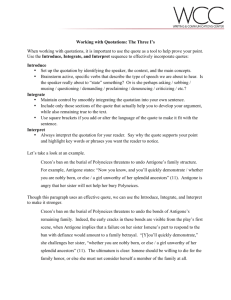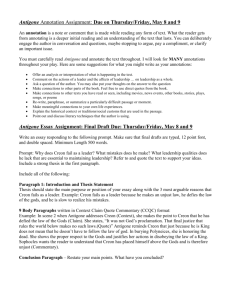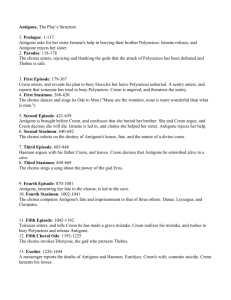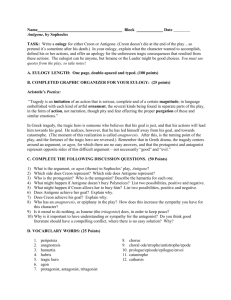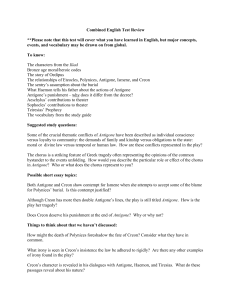Antigone 2 - Tripod.com
advertisement
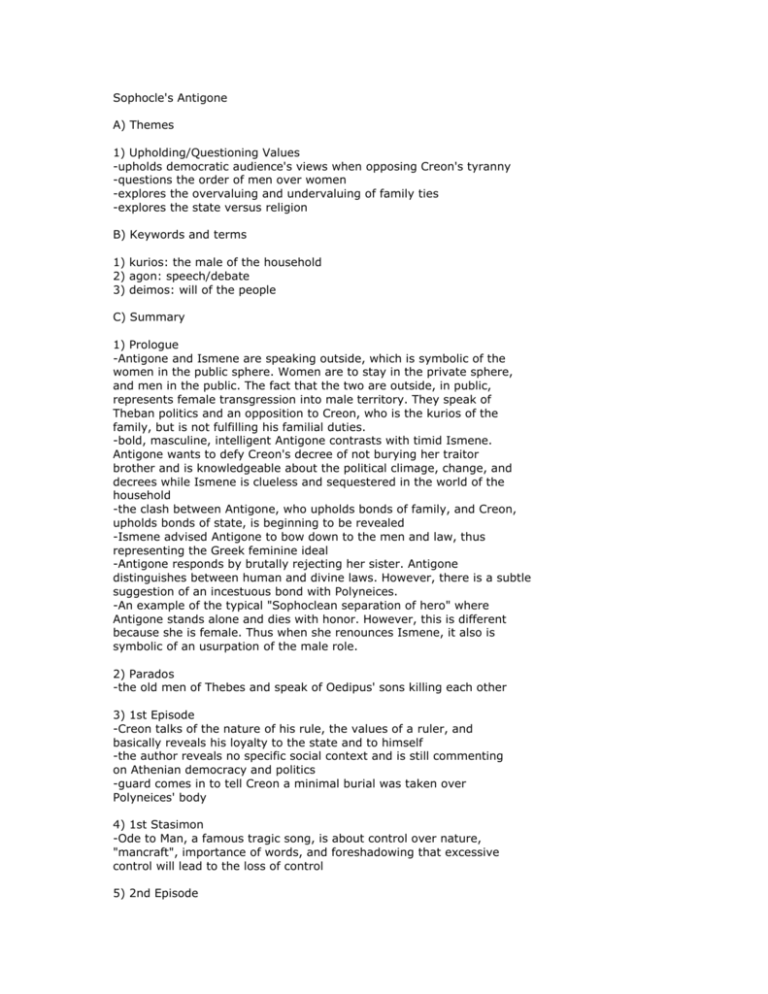
Sophocle's Antigone A) Themes 1) Upholding/Questioning Values -upholds democratic audience's views when opposing Creon's tyranny -questions the order of men over women -explores the overvaluing and undervaluing of family ties -explores the state versus religion B) Keywords and terms 1) kurios: the male of the household 2) agon: speech/debate 3) deimos: will of the people C) Summary 1) Prologue -Antigone and Ismene are speaking outside, which is symbolic of the women in the public sphere. Women are to stay in the private sphere, and men in the public. The fact that the two are outside, in public, represents female transgression into male territory. They speak of Theban politics and an opposition to Creon, who is the kurios of the family, but is not fulfilling his familial duties. -bold, masculine, intelligent Antigone contrasts with timid Ismene. Antigone wants to defy Creon's decree of not burying her traitor brother and is knowledgeable about the political climage, change, and decrees while Ismene is clueless and sequestered in the world of the household -the clash between Antigone, who upholds bonds of family, and Creon, upholds bonds of state, is beginning to be revealed -Ismene advised Antigone to bow down to the men and law, thus representing the Greek feminine ideal -Antigone responds by brutally rejecting her sister. Antigone distinguishes between human and divine laws. However, there is a subtle suggestion of an incestuous bond with Polyneices. -An example of the typical "Sophoclean separation of hero" where Antigone stands alone and dies with honor. However, this is different because she is female. Thus when she renounces Ismene, it also is symbolic of an usurpation of the male role. 2) Parados -the old men of Thebes and speak of Oedipus' sons killing each other 3) 1st Episode -Creon talks of the nature of his rule, the values of a ruler, and basically reveals his loyalty to the state and to himself -the author reveals no specific social context and is still commenting on Athenian democracy and politics -guard comes in to tell Creon a minimal burial was taken over Polyneices' body 4) 1st Stasimon -Ode to Man, a famous tragic song, is about control over nature, "mancraft", importance of words, and foreshadowing that excessive control will lead to the loss of control 5) 2nd Episode -the sentry returns with captured Antigone. They caught her when she tried to re-bury Pol's body -sentry retells of how a storm tried to give her cover, which is symbolic that the divine is on her side -chorus compares Antigone to her father because both are stubborn -Creon feels threatened and emasculated because a woman is standing up to him -Antigone says the old men are with her but they're afraid to speak because of Creon's tyrannical rule -Creon says she's disrespecting her other brother but Antigone counters she's respecting both -Creon has Ismene captured because he believes she's part of the conspiracy. Ismene tries to take responsibility of the crime as well, accepting Creon's suspicion but Antigone rejects and denies Ismene because she failed to actually help. -Creon sentences Antigone to death, scoffing that she will quiver with fear when it is obvious from her personality that she won't 6) 2nd Stasimon - speaks of the curse of the House of Laius - rejecting bonds of family (Antigone w/ Ismene and Creon) and having too much bonds of family (Polyneices) 7) 3rd Episode -debate between Creon and Hymon on the fate of Antigone -Hymon and Antigone are engaged but Creon calls if off by sentencing her to death because believes his son will find another bearer of his children. He doesn't recognize Hymon really loves her -hypocrsy in Creon's emphasis on "loyalty" -Creon's obsession with control over family and state is fascist-like. He has a need for absolute obedience and subordination -Creon speaks of the "gender" issue and says men are stronger. He's confusing the issue because it's not about man vs. woman, but divine law vs. state law -Hymon cautiously emphasizes reason and listening to other opinions. He describes how the people can't say anything to Creon's face for fear of his temper. The people support Antigone and Creon is against the deimos. Hymon speaks of the flexibility a ruler should have and uses the analogy of trees in a storm -Creon's enraged, authoritarian nature shows through as he heatedly fires back with: "state is king" -Hymon says Antigone's death will result in a second death but Creon takes it as a threat to himself, and not to Hymon. It actually foreshadows Hymon's death -Creon describes his cowardly execution of Antigone. Since she is a family member, he will merely lock her up in a cave to eventually die of starvation 8) 3rd Stasimon - speaks of the power of Eros/Aphrodite -reveals irrationality and emotionality of Creon and foreshadows Hymon's suicide 9) 4th Episode -Antigone is lead to her death while the public watches -she gives lamentation and also gains/wins honor (Bride of Hades, marrying death) -her march to her death is contrasted with marriage procession. However, hers is an incestuous perversion, because she is joining her brother in death. She overvalues the family consisting of her brother and not her sister or the making of her own family. 10) 4th Stasimon -speaks of the famous "examples" comparative to Antigone such as Danae locked in a chest, another one entombed due to Aphrodite's wrath 11) 5th Episode -Tiresias enters the stage to reveal the true will of the gods. He disagrees with Creon and tells him the king has no divine or mortal support -Despite the "monstrous" image of eagles rescuing wrecked pieces of Polyneices, Creon still won't care about the gods turning away and ignoring sacrifices -Creon is a hypocrite because he claims to be for the common good yet he doesn't care about the "pollution" of the people -Creon has things "ass backwards". He has reversed the natural order. He didn't entomb the dead person (Pol) but the live one (Ant). When Tiresias says Creon will personally pay for this, Creon then begins to care about the situation. -Now here is the reversal of previous attitudes about State Over Family -He runs to stop his decree 12) 5th Stasimon -messengers tell of Antigone's suicide (hangs herself with a veil) - she is portrayed as cold, headstrong, and not one to wait for a slow death -Hymon lamenting, an example of affection of woman over father -Creon was burying Polyneices, and then comes to the cave to find Antigone dead. Hymon tries to kill him, misses, kills himself with his sword. Hymon's marriage with Antigone is finally realized in death -(a contrast with Tracchis' play which is about the successful coming of age of boys. Hymon's example is a failure to come of age) 13) Exodos -Eurydice kills herself and Creon laments the death of his wife and son -contrast with Ode of Man -Creon says one must submit to gods, not to the wisdom of men D) Important Quotes 1) Prologue - 14-25 - 44-52 - 53-61 - 77-81 2) Parodos - 116-22 3) First Episode ( - 136 - 162-170 - 186-198 4) First Stasimon - 228-251 5) Second Episode - 281-292 310-314 325-334 346-355 363-371 413-415 6) Stasimon - none 7) Third Episode - 448-459 - 467-480 - 488-491 - 495-511 - 516-524 - 538-550 - 584-592 8) Third Stasimon - 601-608 9) Fourth Episode - 619-622 - 645-649 10) Fourth Stasimon - none 11) Fifth Episode - 748-758 - 767-770 - 793-801 - 816-817 12) Fifth Stasimon - none 13) Exodos - 911-915 - 920-928 - 938-942 - 986-994



